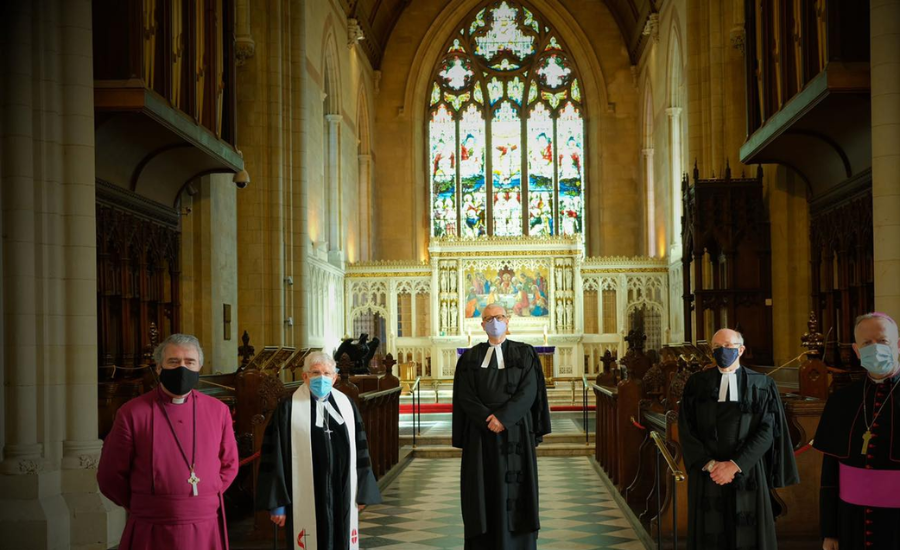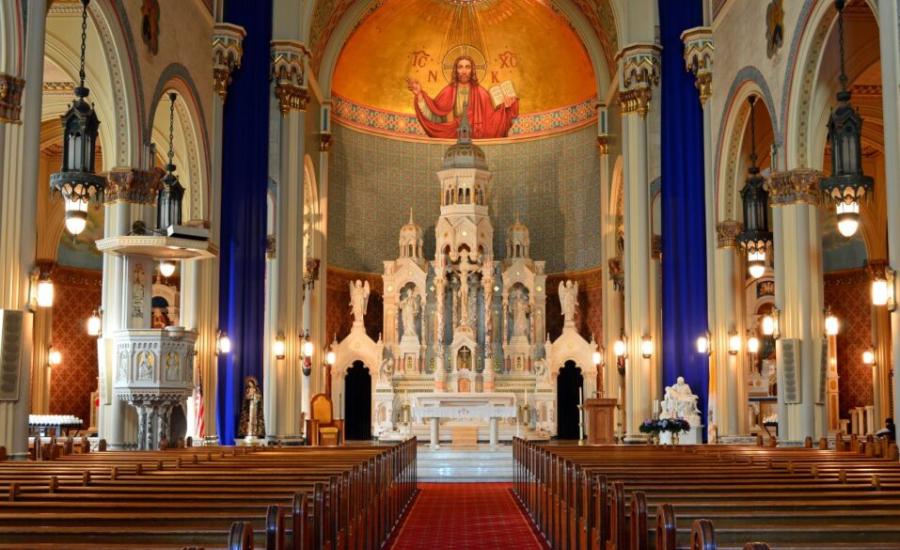Gateway north point church pastor resigns now rebranded as Newlands Church, is currently embroiled in a major leadership crisis, marked by the resignation of its fourth pastor in just two months. This latest development has intensified the church’s ongoing struggle with frequent leadership changes, leaving the community in a state of uncertainty. The most recent departure involves Executive Pastor Kemtal Glasgow, who stepped down on August 21, 2024.
A Turbulent Period for Newlands Church
Newlands north point church pastor resigns, located in North Texas, has been undergoing significant changes since its rebranding from Gateway Church. The church’s transition has not been smooth, and the recent spate of pastor resignations has compounded the challenges faced by its leadership and congregation. Each departure has brought its own set of issues, contributing to an atmosphere of instability and concern within the church community.

The Resignation of Executive Pastor Kemtal Glasgow
On August 21, 2024, Executive Pastor Kemtal Glasgow officially resigned from his position at Newlands Church. The announcement was made via a private YouTube video shared with church members, in which north point church pastor resigns elder Tra Willbanks provided an update on the situation. The video confirmed that Glasgow’s resignation was due to a “moral issue” that rendered him unfit for his pastoral role.
The specific nature of the moral issue leading to Glasgow’s resignation has not been publicly disclosed. This lack of clarity has only fueled speculation and concern among church members and observers, as the community grapples with the implications of yet another leadership change.
Impact on the Church Community
The repeated resignations at Newlands north point church pastor resigns have had a profound impact on its congregation. Regular members are facing increased uncertainty about the future of their church, which has been struggling with maintaining consistent pastoral leadership. Each departure adds to the emotional and spiritual strain on the church community, which now must contend with the repercussions of Glasgow’s exit.
Historical Context of Leadership Changes
To understand the current turmoil, it’s essential to look at the broader context of leadership changes at Newlands north point church pastor resigns . Since its rebranding, the church has experienced a series of abrupt leadership shifts, which have disrupted the continuity of its pastoral care. The departure of Glasgow marks the fourth such resignation within a two-month period, highlighting a troubling pattern for the church.
Each resignation has been accompanied by varying degrees of public and internal controversy, contributing to the church’s overall sense of instability. These repeated changes have raised questions about the church’s governance and its ability to provide steady spiritual guidance to its members.
Responses from Church Leadership
In response to the latest resignation, Newlands Church leadership has been working to address the concerns of its congregation. The decision to use a private YouTube video for the announcement reflects an attempt to manage the situation with a degree of transparency, albeit without full disclosure of the underlying issues

Church elder Tra Willbanks’ statement emphasized that Glasgow’s departure was due to a moral issue, but provided no further details. This approach aims to maintain a level of privacy while also acknowledging the seriousness of the situation.
Future Implications for Newlands Church
The current leadership turmoil at Newlands Church represents a significant turning point with far-reaching implications for its future. As the church grapples with the resignation of yet another pastor, several critical factors will determine whether it can navigate this period of instability and emerge stronger.
Challenges Facing Newlands Church
- Ongoing leadership Instability
The repeated resignation of pastors within a short span reflects deeper issues within the church’s leadership structure. Frequent changes in leadership can disrupt the continuity of pastoral care and create a sense of uncertainty among the congregation. This instability poses a challenge for maintaining a cohesive vision and direction for the church.
- Effectiveness of Crisis Management
The church’s response to the current crisis will be pivotal in shaping its future. Effective crisis management involves not only addressing the immediate concerns but also implementing strategies to prevent future occurrences. The church’s ability to handle this situation with transparency and competence will influence its reputation and credibility.
Implications
- Trust Building: Transparent communication and decisive action are essential for rebuilding trust with the congregation. The church must demonstrate a commitment to addressing the root causes of the leadership crisis and ensuring accountability.
- Reputation Management: How the church manages the crisis will impact its public image and relationships with the wider community. A well-managed response can help restore confidence and support.
- Congregational Response and Adaptation
The response of the church’s congregation will play a critical role in shaping the future of Newlands Church. Members’ willingness to engage in the church’s recovery process and adapt to changes will significantly influence the church’s ability to stabilize and grow.
Implications:
- Engagement: Active participation from the congregation in supporting the church’s recovery efforts can contribute to a stronger sense of community and collective purpose.
- Adaptation: The congregation’s ability to adapt to changes in leadership and church structure will be crucial for maintaining continuity and fostering resilience.
- Long-Term Strategic Planning
In the aftermath of the leadership crisis, Newlands Church will need to focus on long-term strategic planning to ensure sustained stability and growth. This planning should address both the immediate needs arising from the crisis and the long-term vision for the church’s future.
Implications:
- Vision and Mission: Reaffirming and clarifying the church’s mission and vision will provide a foundation for future growth and direction. A clear sense of purpose can help guide the church through challenging times and inspire the congregation.
- Structural Reforms: Implementing structural reforms to improve governance and leadership processes can help prevent future crises. This may include developing robust succession plans, enhancing internal communication, and strengthening oversight mechanisms.
- Support Systems and Resources
Ensuring that adequate support systems and resources are in place is essential for the church’s recovery. This includes providing support to affected staff and congregation members, as well as accessing external resources if needed.
- Community Outreach and Engagement
Rebuilding relationships with the broader community and engaging in outreach efforts can help Newlands Church restore its position and relevance. Engaging with the local community and addressing any concerns or perceptions about the church will be important for rebuilding trust and support.

Community Reactions and Concerns
The resignation of Kemtal Glasgow has elicited a range of reactions from the Newlands Church community. Some members are expressing frustration and disappointment over the continued instability, while others are concerned about the impact on the church’s mission and programs.
In times of leadership change, it is common for congregations to experience a range of emotions, including confusion, anxiety, and a sense of loss. The ongoing situation at Newlands Church is no exception, as members navigate the complexities of yet another transition.
Comparative Analysis of Similar Cases
The current turmoil at Newlands Church, marked by the resignation of multiple pastors over moral issues, reflects a broader pattern experienced by many religious organizations. Examining similar cases in different churches provides valuable insights into how these situations are managed and which strategies prove effective in navigating such crises.
Historical Context of Church Leadership Crises
Leadership crises in religious institutions are not uncommon. Throughout history, churches have faced various challenges, including scandals, moral failings, and leadership changes. These issues can stem from a range of factors, such as ethical lapses, financial misconduct, or interpersonal conflicts. The response to these crises often determines the long-term stability and health of the church.
For example, in the early 2000s, several high-profile Protestant denominations in the United States experienced significant upheavals due to leadership scandals. These events highlighted the vulnerability of churches to such crises and underscored the need for effective crisis management strategies.
Case Studies of Leadership Changes
- The Hillsong Church Scandal (2022)
Hillsong Church, a prominent global church network, faced a major leadership crisis when its founder, Brian Houston, resigned following allegations of misconduct. The church’s response involved appointing interim leaders and conducting an internal review. Hillsong’s approach included transparent communication with the congregation and a commitment to addressing the issues raised.
Lessons Learned:
- Transparency: Clear and open communication with the congregation can help maintain trust.
- Interim Leadership: Appointing interim leaders can provide stability while the church navigates the crisis.
- The Southern Baptist Convention Controversy (2021)
The Southern Baptist Convention (SBC) faced significant challenges related to allegations of sexual abuse and mishandling of such cases. The convention’s leadership struggled to address these issues effectively, leading to widespread criticism and calls for reform. The SBC eventually took steps to improve its handling of abuse cases and increase accountability.
Lessons Learned:
- Accountability: Establishing clear mechanisms for accountability is crucial in addressing misconduct.
- Reform: Implementing reforms and improving policies can help rebuild trust and prevent future issues.
- The Catholic Church Sexual Abuse Crisis (2000s)
The Catholic Church experienced a widespread scandal involving allegations of sexual abuse by clergy members. This crisis led to extensive media coverage and public scrutiny. The church’s response included apologies from the Pope, financial settlements, and changes in policies regarding the handling of abuse cases.
Lessons Learned
- Policy Changes: Revising policies and procedures can help address systemic issues and restore credibility.
- Support Systems: Providing support to victims and survivors is essential in the healing process.
Characteristics of Churches Successfully Navigating Crises
Churches that have managed leadership crises effectively often share several key characteristics:
- Strong Internal Communication
Effective internal communication is vital during a crisis. Churches that maintain open lines of communication with their members are better able to manage misinformation, address concerns, and provide reassurance. Clear and consistent messaging helps prevent rumors and fosters a sense of stability.

Best Practices:
- Regular updates from leadership.
- Opportunities for congregation members to ask questions and express concerns.
- Supportive Leadership Structures
A supportive and well-structured leadership team can provide stability during a crisis. Churches with strong governance frameworks and a collaborative leadership approach are better equipped to handle transitions and manage the aftermath of a crisis.
Best Practices
- Having a clear succession plan for leadership roles.
- Ensuring that leadership teams work together to address issues.
- Clear Mission and Values
Churches that maintain a strong focus on their mission and values are better able to navigate crises. A clear understanding of the church’s purpose and core values can provide guidance and support during challenging times. This focus helps the congregation stay united and committed to the church’s overall goals.
Best Practices:
- Reaffirming the church’s mission and values during a crisis.
- Aligning responses and decisions with the church’s core principles.
- Crisis Management Plans
Having a well-developed crisis management plan is essential for any organization facing potential challenges. Churches with established protocols for handling various types of crises are better prepared to respond effectively and minimize the impact on their community.
Best Practices:
- Developing and regularly updating a crisis management plan.
- Training leaders and staff in crisis response procedures.
Facts
- Current Situation
- Church Name: Newlands Church (formerly Gateway Church)
- Location: North Texas
- Recent Development: The resignation of Executive Pastor Kemtal Glasgow on August 21, 2024.
- Reason for Resignation: A “moral issue” that made him unfit for his role; specific details of the issue were not disclosed.
- Leadership Changes
- Timeline: Glasgow’s resignation marks the fourth pastor departure within two months.
- Previous Departures: Not detailed, but each resignation has contributed to a pattern of instability.
- Communication
- Announcement: Made via a private YouTube video shared with church members.
- Spokesperson: Church elder Tra Willbanks confirmed the resignation and cited a moral issue without further details.
- Impact
- Congregational Reaction: Increased uncertainty and emotional strain among members.
- Community Concerns: Questions about the church’s stability and future direction.
- Historical Context
- Rebranding: The church underwent a rebranding from Gateway Church to Newlands Church prior to the current crisis.
- Past Issues: The church has faced significant challenges related to leadership consistency.
FAQs
Q: Why did Executive Pastor Kemtal Glasgow resign?
A: Executive Pastor Kemtal Glasgow resigned due to a “moral issue” that disqualified him from his pastoral role. The specific nature of the issue has not been publicly disclosed.
Q: How many pastors have resigned from Newlands Church recently?
A: Newlands Church has experienced the resignation of four pastors in the span of two months, including the recent departure of Kemtal Glasgow.
Q: What steps is Newlands Church taking in response to the leadership crisis?
A: The church has attempted to manage the crisis with a degree of transparency, using a private YouTube video for announcements. Leadership is focusing on addressing immediate concerns and planning for future stability.
Q: What impact has the crisis had on the church community?
A: The repeated resignations have led to increased uncertainty and emotional strain among the congregation, impacting members’ confidence in the church’s leadership and stability.
Q: What can Newlands Church do to recover from this crisis?
A: Key steps include improving internal communication, establishing a clear long-term strategic plan, supporting interim leadership, and engaging with the community to rebuild trust and stability.
Q: Are there any similar cases to the situation at Newlands Church?
A: Yes, similar leadership crises have occurred in other churches, such as Hillsong Church, the Southern Baptist Convention, and the Catholic Church during the sexual abuse crisis. These cases provide valuable lessons in crisis management and recovery.
Conclusion
The ongoing leadership crisis at Newlands Church underscores the challenges faced by religious institutions dealing with frequent changes in pastoral leadership. The resignation of Executive Pastor Kemtal Glasgow adds to the church’s recent pattern of instability, impacting both the leadership and the congregation.
As Newlands Church navigates this turbulent period, its ability to recover and thrive will hinge on several factors. Effective crisis management, transparent communication, and strong leadership structures are essential for addressing the immediate concerns and planning for long-term stability. The church must also focus on engaging its congregation and the broader community to rebuild trust and confidence.
Historical and comparative analyses of similar cases reveal that churches with clear mission statements, supportive leadership frameworks, and well-developed crisis management plans are better equipped to handle such crises. By applying these lessons, Newlands Church can work towards overcoming its current challenges and ensuring a more stable and resilient future.
The path forward will require a concerted effort from all stakeholders, including church leadership, staff, and congregation members, to address the underlying issues and foster a renewed sense of purpose and unity. Through strategic planning and effective management, Newlands Church has the potential to emerge from this crisis stronger and more aligned with its mission and values.
Read More: News Week Blog



